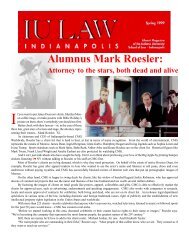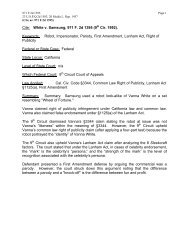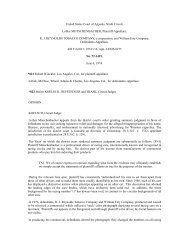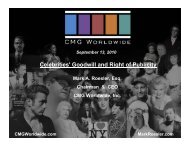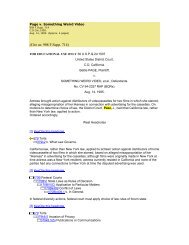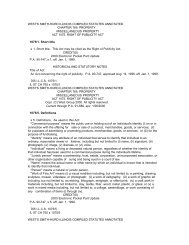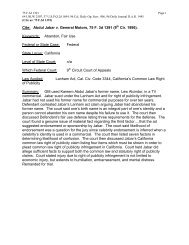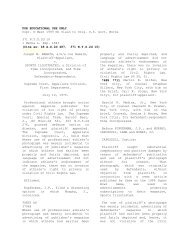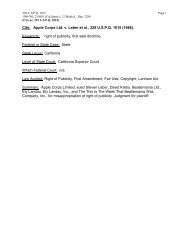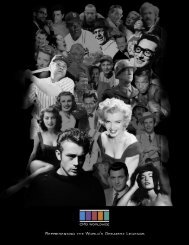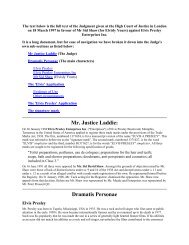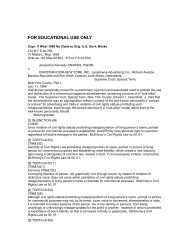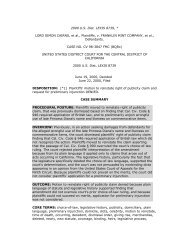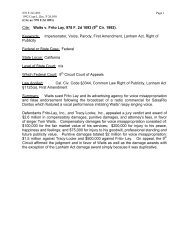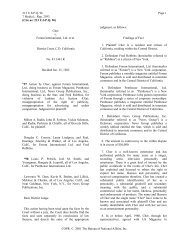Hustler v. Falwell.pdf - Mark Roesler
Hustler v. Falwell.pdf - Mark Roesler
Hustler v. Falwell.pdf - Mark Roesler
Create successful ePaper yourself
Turn your PDF publications into a flip-book with our unique Google optimized e-Paper software.
to capitalize on Allen's familiar name, face and "reputation for artistic<br />
integrity" in order to boost sales of its movie rentals, the court found that<br />
such use violated the Lanham Act's prohibition against misleading advertising.<br />
Dallas Cowboys, which involved the pornographic film "Debbie Does Dallas,"<br />
in<br />
which the central character participates in sexual escapades wearing some but<br />
not always all the distinctive trademarked costume of the Dallas Cowboy<br />
Cheerleaders, presents a closer question concerning the unauthorized use of a<br />
celebrity's notoriety. On plaintiff's motion for [**16] a preliminary<br />
injunction, the court was asked to decide whether the film "Debbie Does<br />
Dallas,"<br />
its promotion, and its advertising violated Section 43(a). In addition to<br />
finding that the movie depicted the film's lead, Debbie, engaging in sexually<br />
explicit conduct wearing a uniform resembling the Dallas Cowboy Cheerleaders<br />
uniform, the court found that the defendants had advertised the film with a<br />
PAGE 31<br />
695 F. Supp. 112, *118; 1988 U.S. Dist. LEXIS 8694, **16;<br />
8 U.S.P.Q.2D (BNA) 1562; 15 Media L. Rep. 2097<br />
large marquee containing a picture of Debbie wearing the uniform and that print<br />
advertisements for the film falsely represented that the woman playing the role<br />
of Debbie was an ex-Dallas Cowboy Cheerleader. Stating that "[i]t would appear<br />
obvious that Section 43(a) of the Lanham Act applies to a motion picture,"<br />
Dallas Cowboys, 467 F. Supp. at 375, the court next considered whether the<br />
First<br />
Amendment afforded any protection to the defendants.<br />
The film's promoter argued that the film was a parody or satire on female<br />
cheerleaders. Addressing this argument, the court stated:<br />
It has been long settled in our jurisprudence that the rights of free<br />
expression, embodied in the First Amendment and other legal doctrines are<br />
subject to rights under the copyright and trademark laws. In the copyright<br />
[**17] area, one means of accommodation between the conflicting interests is<br />
the "fair use" doctrine, which permits certain use of copyrighted material to be<br />
made for purposes such as news reporting, criticism, scholarship -- and parody<br />
and satire.<br />
Id. (citing Second Circuit copyright "fair use" cases). After discussing the<br />
meaning of the terms parody and satire, the court strongly rejected the<br />
defendant's claim that "Debbie Does Dallas" fell within that definition:<br />
In the present case, there is no content, by way of story line or otherwise,<br />
which could conceivably place the movie Debbie Does Dallas within any<br />
definition<br />
of parody and satire. The purpose of the movie has nothing to do with humor;<br />
it has nothing to do with a commentary, either by ridicule or otherwise, upon<br />
the Dallas Cowboys Cheerleaders. There is basically nothing to the movie<br />
Debbie<br />
Does Dallas, except a series of depictions of sex acts.<br />
Dallas Cowboys, 467 F. Supp. at 376. The court concluded that the plaintiff's<br />
service marks and trademarks had been misappropriated for commercial<br />
purposes:



